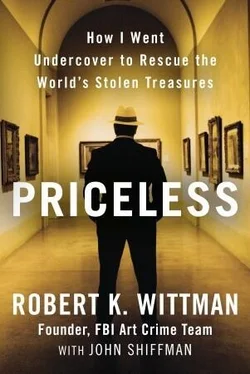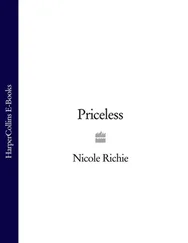Laurenz’s story was a quintessential Florida immigrant tale: A former accountant and money changer for wiseguys in Paris, he had fled France a wanted man. Laurenz arrived in Miami with $350,000 in the mid-1990s, at the dawn of the last real estate boom. He smartly parlayed a combination of no-interest loans and a keen eye for distressed properties—plus a few well-timed bribes to the right lenders—into the American dream. Most of what Laurenz told me checked out, and on paper, he was probably worth $100 million. He lived in a gated $2 million house with a pool and Jet Skis docked on a private canal that fed into Miami Bay. He wore monogrammed shirts and rarely went a week without a manicure. Laurenz drove the Rolls everywhere, unless he needed to ferry his dogs. For that, he used the Porsche.
Sunny and Laurenz had not known each other in France. They’d met in Miami. But they knew some of the same people back home, wiseguys with access to the people holding the stolen Vermeer and Rembrandts in Europe. The French police wiretaps confirmed that Sunny and Laurenz spoke regularly with known European art thieves, and on the calls, they talked about selling a Vermeer. There was only one missing Vermeer in the world, the one from the Gardner.
As I approached the yacht, I took in the scene—the hearty welcome, the bikini babes, the thundering calypso music, and it struck me as slightly off key. I wondered if we weren’t trying too hard. Sunny and Laurenz weren’t stupid. They were good crooks.
We shoved off and cruised Miami Harbor for a good hour. We ate, we sipped bubbly, we soaked up the vista. It was a party. Two of the women cooed over Sunny while Laurenz and I chatted with the lead Colombian dealer. Once we were well under way, a third woman took it up a notch. She grabbed a champagne glass and a bowl of fruit and yelled “Strawberry-eating contest!” She raced out to the deck, laid a blanket down and got on her knees. Dangling a strawberry over her face, she covered it in whipped cream and lowered it lasciviously between her well-glossed lips. She sucked it slowly, and the other undercover female FBI agents took their turns. I guess it was all good drug-dealer bimbo fun until the undercover women made a dumb mistake. They crowned Sunny as judge of their contest, making him the center of attention. It didn’t play right—the chubby, lowest-ranking guy in our gang getting the royal treatment. Sunny fidgeted uncomfortably. I shoved my hands in my pockets and glared at the women.
Once again, our investigation was veering dangerously off course—yet another instance of too many people too eager to play a role. And there wasn’t much I could do about it.
I hated this helpless feeling. As the FBI’s only undercover agent who worked art crime cases, I was used to calling the shots. True, I carried a reputation for taking risks, but I also got results. In eighteen years with the bureau, I’d already recovered $225 million worth of stolen artworks and antiquities—icons of American history, European classics, and artifacts from ancient civilizations. I’d built a career catching art thieves, scammers, and black-market traders in nearly every art venue, going undercover in places as distant as Philadelphia, Warsaw, Santa Fe, and Madrid. I’d rescued works of art by Rodin, Rembrandt, and Rockwell, and pieces of history as varied as Geronimo’s headdress and a long-lost copy of the Bill of Rights. I was months away from recovering the original manuscript for Pearl Buck’s The Good Earth .
I understood that art crime cases couldn’t be handled like your garden-variety Miami cocaine deal or strong-arm Boston robbery. We weren’t chasing common criminal commodities like cocaine, heroin, and laundered cash. We were in pursuit of the priceless—irreplaceable art, snapshots of human history. And this was the biggest unsolved case of them all.
No one else on the boat had ever worked an art crime investigation. Few FBI agents ever have. Most American law-enforcement agencies, the FBI included, don’t give much thought to saving stolen art. They’re much more comfortable doing what they do best, busting criminals for robbing banks, dealing drugs, or fleecing investors. Today’s FBI is so focused on preventing another terrorist attack that nearly a third of the bureau’s thirteen thousand agents now spend their time chasing the ghost of Bin Laden. There has long been no interest in art crime. For many years after 9/11, this worked to my advantage. I got to call the shots on my cases and remain in the shadows. Generally, my FBI supervisors were competent, or at least tolerable. They trusted me to do my job, and let me operate autonomously from Philadelphia.
Operation Masterpiece, the name another agent gave the Gardner case, was different. Agents on both sides of the Atlantic were hungry to share a chunk of this grand prize. Supervisors in almost every office involved—Miami, Boston, Washington, Paris, Madrid—demanded a major role. For when the case was solved, they all wanted a stake in the glory, their picture in the paper, their name in the press release.
The FBI is a giant bureaucracy. By protocol, the bureau generally assigns cases to the appropriate squad in the city where the crime occurred, regardless of expertise. Most art crime investigations are run by the same local FBI unit that handles routine property theft—the bank robbery/violent crime squad. Once assigned, the cases are rarely transferred afterward. For most middle managers, the priority isn’t cases, it’s careers. No supervisor wants to make a controversial decision, such as transferring a big case to headquarters or to an elite unit like the Art Crime Team, because it might insult or embarrass another supervisor, potentially crippling someone’s career. So the Gardner investigation—the biggest property crime of any kind in the history of the United States and the world’s highest-profile art crime—was spearheaded not by the FBI Art Crime Team, but by the chief of the local bank robbery/violent crime squad in Boston.
It was, of course, the case of this supervisor’s career, and he spent a great deal of time making sure no one took it away. He didn’t like me, probably because of my reputation for taking chances, moving swiftly, doing things without waiting for written approval, risks that might jeopardize his career. He’d already tried to throw me off the case, writing a lengthy and outrageous memo questioning my integrity, a memo that he’d since withdrawn. Although I was back on the case, the supervisor had still insisted on inserting one of his Boston-based undercover agents into the mix. This was the hard-boiled sullen Irish American on the boat camped on the curved couch, fixated on his text messages. I found his odd presence a distraction, an unnecessary ingredient that threatened to spook the savvy Sunny and Laurenz.
The FBI supervisors in Miami and Paris were better than the one in Boston, but not by much. The Miami agents seemed more comfortable chasing kilos of cocaine than a bunch of fancy paintings, and dreamed of enticing Sunny into a drug deal, creating yet another distraction. The FBI’s liaison in Paris was too focused on keeping his French police counterparts satisfied, and knew they would be happy only if the arrests occurred in France, where they could make a big splash. The French commander had even called me the day before the yacht sting to ask if I could cancel the meeting. He needed time, he said, to insert a French undercover agent on the boat, and asked me to play down my role as the primary art expert. I’d stifled the impulse to ask why I should take orders from a French cop about an American operation in Florida. Instead, I simply told him we couldn’t wait.
Undercover stings are stressful enough without meddling from people who are supposed to have your back. You never know if the bad guys have bought in to your rap, or are laying an ambush. One slipup, one off-key comment, and a case can be lost. In the world of high-end art crime, where you are buying paintings worth ten or twenty or a hundred million dollars, the seller expects the buyer to be a true expert. You have to project an image of expertise and sophistication that comes with years and years of training. It can’t be faked. In this case, we were dealing with people with Mediterranean mob connections, humorless wiseguys who didn’t just kill snitches and undercover cops. They murdered their families, too.
Читать дальше












